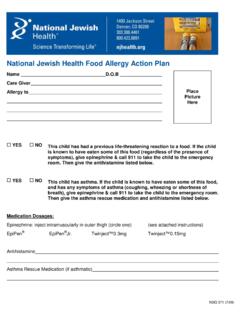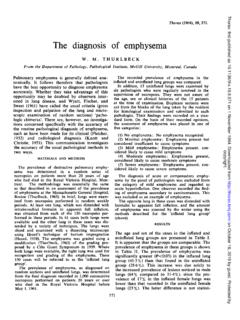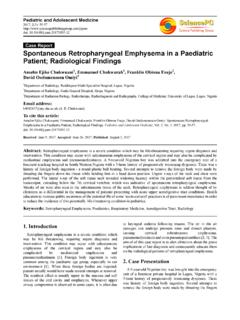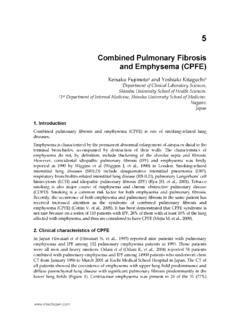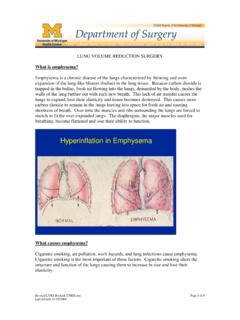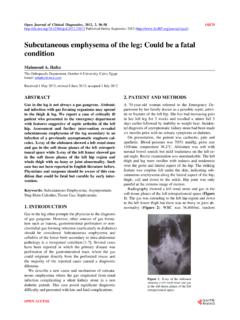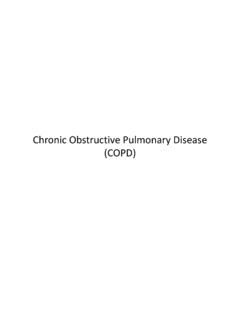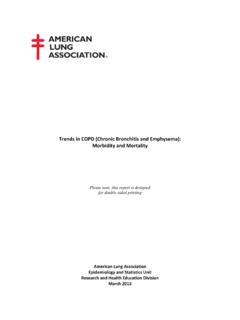Transcription of Alpha-1 Antitrypsin Deficiency - National Jewish …
1 Alpha-1 Antitrypsin Deficiency Chronic obstructive pulmonary disease or COPD for short is a lung disease that affects millions of people each year. COPD is a general term used to describe diseases such as emphysema and chronic bronchitis. In emphysema there is damage to the walls of the air sacs (alveoli) in the lungs. The earliest symptom of emphysema is shortness of breath during activity. Later the shortness of breath can occur at rest also. What can cause emphysema ? Most cases of emphysema are caused by smoking or other environmental factors.
2 There is growing evidence that genetics can also increase the risk of developing emphysema . In about one out of every 50 cases of emphysema , there is a specific hereditary basis for developing disease at an earlier age. This results in worse disease than normally seen with the risk factors for developing disease and at time no obvious risk factors for developing disease. The inherited form of emphysema is called Alpha-1 Antitrypsin Deficiency or " Alpha-1 " for short. People with this disorder don't have enough of a major protein in the blood.
3 This protein is Alpha-1 Antitrypsin . Although there are many different genetic variations of this protein, only some will cause lung disease. The most common variant of the protein is often seen in people of northern European descent, especially Scandinavians. Recent evidence shows that Alpha-1 can be found in all populations and all ethnic groups. What does the Alpha-1 Antitrypsin protein do in the body? Alpha-1 Antitrypsin is a major protein in the blood. It is produced mainly in the liver cells and goes into the blood stream to protect against inflammation.
4 It protects the lung by blocking the effects of powerful enzymes called elastase. Elastase is normally carried in white blood cells and protects the delicate tissue of the lung by killing bacteria and neutralizing tiny particles inhaled into the lung. Alpha-1 Antitrypsin inactivates elastase once it has finished its job. Without alpha1 Antitrypsin , elastase can destroy the air sacs of the lung. How is the diagnosis made? Because Alpha-1 related disease is COPD, the diagnosis is made by the same methods. Your doctor may have you do a number of tests to evaluate your breathing.
5 These may include: Detailed medical history including family history of lung disease, Physical exam, Breathing tests and X-rays and Oxygen levels. Two special blood tests determine the diagnosis of alpha - 1 Antitrypsin Deficiency . The first test measures the concentration of Alpha-1 Antitrypsin in the blood. A second blood test determines the actual gene product in the person with the disease. The normal gene is an MM genetic pattern. This leads to normal levels of Alpha-1 Antitrypsin in the blood.
6 The most common abnormal genetic pattern seen with Alpha-1 is ZZ. Some people may inherit only a single abnormal gene, such as MZ. The normal population that smokers have a 20% chance of developing emphysema and with the MZ genetic pattern the risk of emphysema is now 50%. How is Alpha-1 Antitrypsin Deficiency managed? Specific therapy has been available for Alpha-1 related emphysema since 1987; a class of medicine called augmentation therapy. This medicine increases the Alpha-1 protein in the blood with normal Alpha-1 Antitrypsin from healthy plasma donors.
7 It is given in a vein (IV). The dose is adjusted based on body weight. This treatment is often given once a week. There are three brands of augmentation therapy. They include: Prolastin Aralast Zemaira In addition to medicines, the management of Alpha-1 related emphysema includes: Exercise and a healthy lifestyle including giving up smoking, Avoidance of infection, Medication therapy, Oxygen therapy, Breathing retraining, Techniques to bring up mucus and Pulmonary rehabilitation. For more information, ask your health care provider for Understanding booklets and Med Facts on any of these topics.
8 Giving up smoking and avoiding secondhand smoke are both very important. Smoking can accelerate or speed the development of the disease and shorten the lifespan. Ask your health care provider about techniques to help you give up smoking. Genetic counseling is important for family members of the person diagnosed with Alpha-1 related emphysema . Family planning issues and early interventions, such as giving up smoking can be addressed. Lung transplants or lung reduction surgery may be an option for people severely affected by the disorder.
9 It is important to appreciate that people with Alpha-1 may never develop emphysema . That is why Alpha-1 is referred to as a disorder or condition, rather than a disease. People with Alpha-1 are also at risk of developing liver disease and certain skin conditions. There may also be an association between Alpha-1 and atypical TB infections in the lung, also called non-tuberculous mycobacteria. What does the future hold? Alpha-1 Antitrypsin Deficiency is fairly common among inherited disorders. Research is constantly being done to develop new therapies.
10 Doctors at National Jewish Health follow one of the largest groups of Alpha-1 patients in the country. Virtually every new medicine evaluated for this condition has been tested here. Doctors and researchers at National Jewish Health are always looking for new ways to manage and treat Alpha-1 and other chronic lung diseases. Note: This information is provided as an educational service of National Jewish . It is not meant to be a substitute for consulting with your own physician. Copyright 1999, 2004, 2007, 2010 National Jewish HEALTH.


